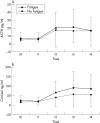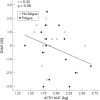Fatigue in multiple sclerosis: an example of cytokine mediated sickness behaviour?
- PMID: 16361589
- PMCID: PMC2117393
- DOI: 10.1136/jnnp.2005.065805
Fatigue in multiple sclerosis: an example of cytokine mediated sickness behaviour?
Abstract
Background: Fatigue is a major complaint of multiple sclerosis (MS) patients. However, little is known about its pathophysiological mechanisms. Evidence from chronic fatigue syndrome and studies on sickness behaviour suggest that immune and neuroendocrine factors may play a causative role in the development of fatigue.
Methods: We compared whole blood stimulatory capacity for pro- (TNFalpha, IFNgamma) and anti-inflammatory cytokines (IL-10) as well as hypothalamo-pituitary-adrenal (HPA) axis function in 15 MS patients with marked fatigue and 15 patients without fatigue as determined by the Fatigue Severity Scale (FSS).
Results: Proinflammatory cytokines were significantly higher (TNFalpha: 478.9 v 228.2 pg/ml, p = 0.01; IFNgamma: 57.6 v 27.8 pg/ml; p = 0.01) in MS patients with fatigue. Furthermore, TNFalpha values significantly correlated with daytime sleepiness as measured by the Epworth Sleepiness Scale (r = 0.64, p = 0.001). Controlling for disease activity (as measured by the Cambridge Multiple Sclerosis Basic Score), disease duration, Expanded Disability Status Scale, and depression further increased the correlation of cytokine production and fatigue. HPA axis activity was not related to fatigue but was modestly correlated with cognitive impairment.
Conclusion: Our data suggest that fatigue in MS is at least partially mediated through activation of proinflammatory cytokines. In line with earlier findings, HPA axis dysfunction seems not to be relevant in MS fatigue pathogenesis but appears to be linked to cognitive impairment. Our findings suggest that increased levels of inflammatory cytokines may be involved in MS fatigue. Investigation of cytokine profiles may increase the understanding of fatigue pathogenesis in MS.
Conflict of interest statement
Competing interests: none declared
Comment in
-
Multiple sclerosis related fatigue.J Neurol Neurosurg Psychiatry. 2006 Jan;77(1):2-3. doi: 10.1136/jnnp.2005.074948. J Neurol Neurosurg Psychiatry. 2006. PMID: 16361582 Free PMC article.
References
-
- Konsman J P, Parnet P, Dantzer R. Cytokine‐induced sickness behaviour: mechanisms and implications. Trends Neurosci 200225154–159. - PubMed
Publication types
MeSH terms
Substances
LinkOut - more resources
Full Text Sources
Medical




